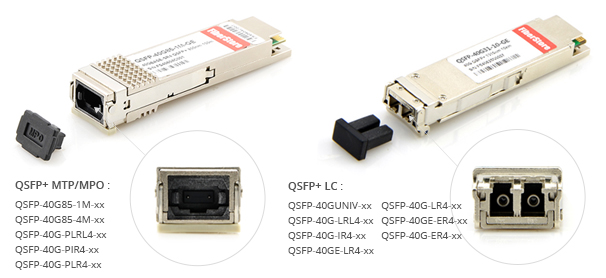Selecting Fiber Patch Cable for 40G QSFP+ Transceivers
With the increasing popularity of 40G Ethernet, 40Gb QSFP+ is considered to be an economical solution for 40G transmission in data center. And to make them run normally and effectively, fiber patch cables must be used to connect those QSFP+ transceivers plugged in Ethernet switches, as shown in the following picture. As the structure of a 40G transmission is more complex, the selection of fiber patch cords for 40G QSFP+ optics becomes more difficult. This article focuses on how to select proper fiber optic jumpers for 40G QSFP+ transceivers.
Before jumping to a conclusion, numerous things need to be taken into consideration when selecting a fiber patch cable for a 40G QSFP+ transceiver in practical cabling. In this article, three factors are introduced: the cable type of fiber patch cords, the connector type of fiber patch cords, and ports of switches that need to be connected.
The first factor to consider is the cable type. Optical signals with the same wavelength perform differently when they run through different types of cables. For example, can a 40GBASE QSFP+ transceiver working on wavelength of 850nm be used with OM1 fiber patch cords? Usually, signals with wavelength of 850nm are transmitted over short distance. Thus selecting a multimode patch cable will be more economical. OM1 fiber patch cables are ususally suggested for 100Mb/s and 1000Mb/s networks, and cannot support 40G transmission, because the transmission distance reduces as the data rate raises. OM3 fiber patch cables and OM4 fiber patch cables, these two types of optimized multimode fiber optic cables, are recommended for your 40G transmissions over short distance. And for long distance transmission, you can choose single-mode fiber patch cables.
The second factor to consider is what types of connectors are attached on both ends of fiber patch cords. Connector types are usually decided by the interfaces of 40G optical transceivers. Usually, 40G QSFP+ transceivers for short distance are armed with MPO interfaces, and for long distance transmission usually employ LC interfaces. For example, Avago AFBR-79E3PZ compatible 40GBASE-SR4 QSFP+ transceiver has MTP/MPO interface, and can support up to 400m over OM4 MMF. However, there are also exceptions. 40G QSFP+ transceivers like 40GBASE-PLR4 QSFP+ transceiver and 40GBASE-PLRL4 QSFP+ transceiver, they are with MPO interfaces but they can support transmission over long distance. One characteristic of MPO connector is high density which can perfectly satisfy the requirements of 40G transmission. But this kind of connection makes the polarity complex. So when selecting this kind of fiber patch cord, it is very necessary to take the polarity into consideration. The picture below shows 40G QSFP+ transceivers with MPO interfaces and LC interfaces.

The third factor is ports of switches that need to be connected. During practical cabling, two situations are common. One is 40G QSFP+ to 40G QSFP+ cabling and the other is 40G QSFP+ to 10G SFP+ cabling. For 40G QSFP+ to 40G QSFP+ cabling: 40GBASE-SR4 QSFP+ transceiver can be used with OM3 fiber patch cable with MPO interfaces to support up to 100m, and with OM4 fiber patch cable with MPO interfaces to support up to 150m; 40GBASE-LR4 QSFP+ transceiver can be used with single-mode fiber patch cables with LC connectors to support up to 10km. For 40G QSFP+ to 10G SFP+ cabling, fan out patch cable with MPO connectors on one end and four LC duplex connectors on the other end is suggested.
Although there are so many factors that need to be considered when selecting the fiber patch cable for 40G QSFP+ transceivers, the first step is to figure out whether single-mode or multimode fiber it is. As the leading fiber optical manufacturer in China, FS.COM offers a large selection of fiber optic patch cords, such as SC LC fiber patch cable, SC SC patch cord, SC ST fiber patch cable, etc. Besides, FS.COM recently launched a series of solutions for 40GBASE-LR4 QSFP+ transceivers connection, including direct connection and interconnection to better help more customers upgrade to 40G networks.
Post Your Ad Here


Comments